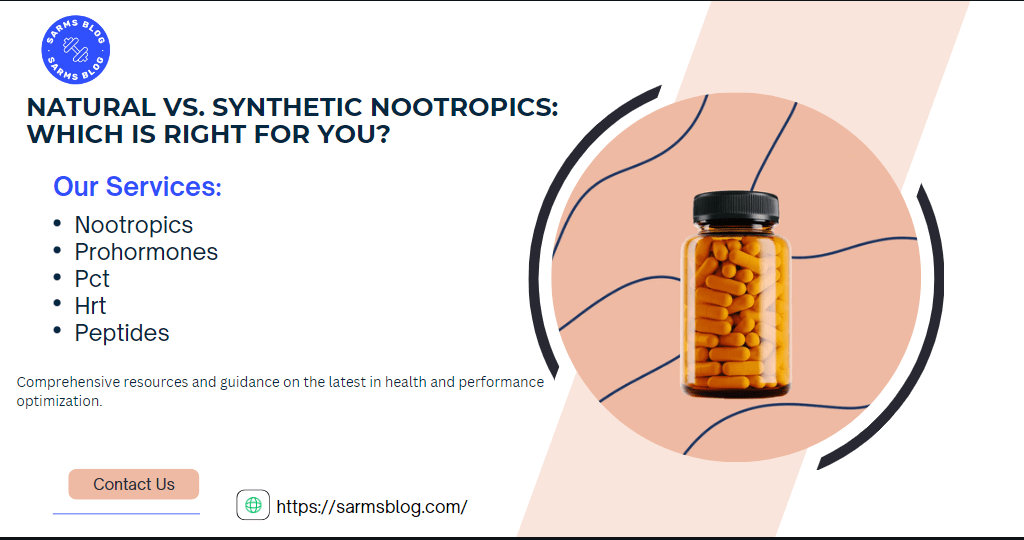
The world of nootropics offers a wide range of options for enhancing cognitive function, including both natural and synthetic substances. At SARMS Blog, we aim to provide you with the information you need to make informed decisions about which type of nootropic is right for you. In this blog, we will explore the differences between natural and synthetic nootropics, their benefits, and how to choose the best option for your needs.
Understanding Natural Nootropics
Natural nootropics are derived from herbs, plants, and other natural sources. They have been used for centuries in traditional medicine to enhance cognitive function and overall brain health. Some popular natural nootropics include:
- Bacopa Monnieri: An herb used in Ayurvedic medicine, known for its ability to improve memory and reduce anxiety.
- Ginkgo Biloba: An ancient tree extract used to enhance memory and increase blood flow to the brain.
- Rhodiola Rosea: An adaptogenic herb that helps the body adapt to stress and improves mental clarity.
- Lion’s Mane Mushroom: A mushroom that promotes neurogenesis and supports overall brain health.
- L-Theanine: An amino acid found in tea leaves that promotes relaxation and reduces anxiety without causing drowsiness.
Understanding Synthetic Nootropics
Synthetic nootropics are man-made compounds developed to enhance cognitive abilities. These substances are often designed to target specific neurotransmitters or brain functions. Some popular synthetic nootropics include:
- Piracetam: One of the first and most well-known synthetic nootropics, known for its ability to improve memory and cognitive function.
- Modafinil: A wakefulness-promoting agent used to treat sleep disorders, also popular for enhancing focus and attention.
- Noopept: A potent nootropic that enhances memory and learning, believed to be more powerful than piracetam.
- Aniracetam: A racetam compound known for its ability to enhance creativity and holistic thinking.
- Huperzine A: A compound derived from Chinese club moss that inhibits the enzyme that breaks down acetylcholine, leading to improved memory.
Comparing Natural and Synthetic Nootropics
Effectiveness: Both natural and synthetic nootropics can be effective in enhancing cognitive function. However, synthetic nootropics are often more potent and may provide faster results. Natural nootropics, on the other hand, tend to have a more gradual and sustained effect.
Safety: Natural nootropics are generally considered safer due to their long history of use in traditional medicine. Synthetic nootropics can also be safe when used properly, but they may have a higher risk of side effects, especially if not used as directed.
Mechanisms of Action: Natural nootropics often work by providing overall support to brain health and function, while synthetic nootropics are designed to target specific neurotransmitters or brain pathways. This means that synthetic nootropics can provide more targeted and potent effects.
Cost: Natural nootropics are typically more affordable and widely available. Synthetic nootropics can be more expensive, especially those that are prescription-only or require more complex manufacturing processes.
Personal Preference: Ultimately, the choice between natural and synthetic nootropics comes down to personal preference. Some individuals prefer natural options for their perceived safety and holistic benefits, while others may opt for synthetic nootropics for their potency and targeted effects.
Conclusion
Choosing between natural and synthetic nootropics depends on your individual needs, preferences, and goals. Both types of nootropics offer unique benefits and can enhance cognitive function in different ways. At SARMS Blog, we are committed to providing you with reliable and up-to-date information on nootropics to help you make informed decisions.
Whether you choose natural or synthetic nootropics, understanding their differences and benefits can help you unlock your brain’s full potential and achieve your cognitive goals.